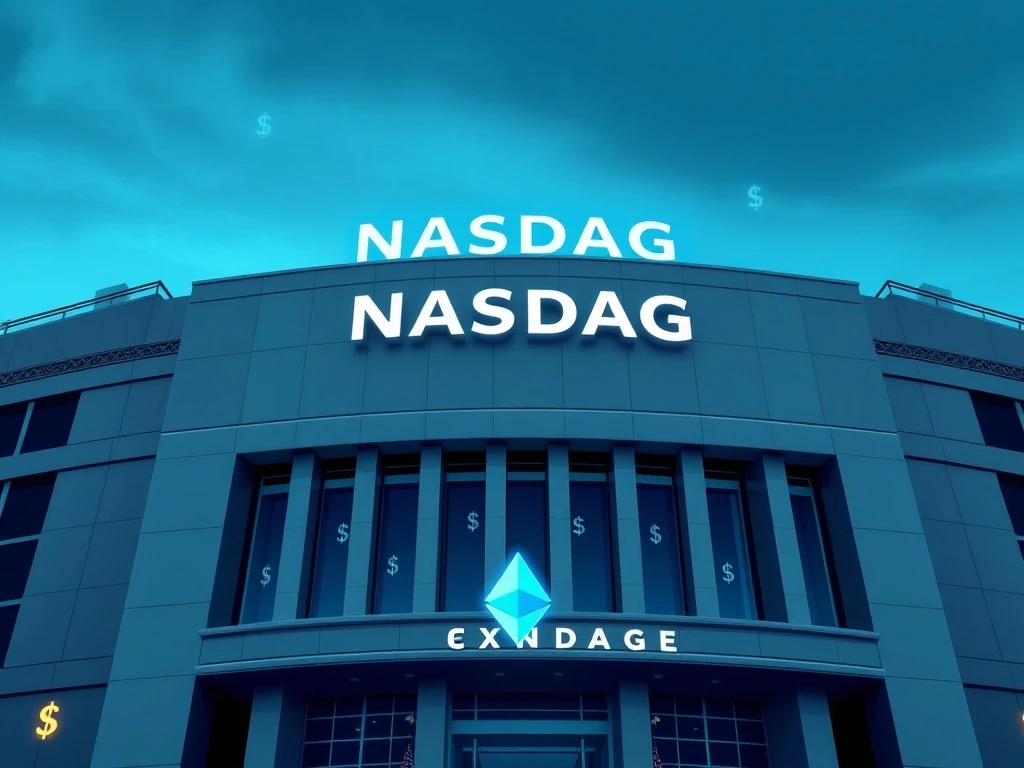BREAKING: Nasdaq’s Bold Move to Integrate Ethereum Staking into BlackRock’s iShares ETH ETF

The cryptocurrency world is buzzing with news that could redefine institutional engagement with digital assets. Nasdaq has officially filed an application to integrate staking capabilities into BlackRock’s proposed iShares ETH ETF, a move that signals a significant shift in how traditional finance views and interacts with the Ethereum ecosystem. This development isn’t just a procedural step; it’s a potential game-changer for investors seeking yield from their digital asset holdings.
The Game-Changing Nasdaq Filing for ETH ETF
Nasdaq, a leading global stock exchange, recently submitted an application to the US Securities and Exchange Commission (SEC) on behalf of asset management giant BlackRock. This application seeks to amend BlackRock’s iShares Ether (ETH) exchange-traded fund (ETF) to include a crucial feature: staking. If approved, this means the fund could offer investors not just exposure to Ether’s price movements but also to the rewards generated from staking the underlying ETH. For years, the integration of staking into crypto ETFs has been a highly anticipated feature by traditional financial institutions, eager to bridge the gap between digital asset innovation and conventional investment vehicles.
Unlocking Value: Ethereum Staking and Institutional Appeal
Ethereum’s transition to a proof-of-stake consensus mechanism opened doors for participants to earn rewards by ‘staking’ their ETH, essentially locking it up to help secure the network. The recent SEC guidance classifying staking rewards as ‘earned income’ rather than securities transactions subject to capital gains tax has been a pivotal moment. This reclassification makes Ethereum staking immensely appealing to institutional investors. Traditional finance institutions operate under mandates to produce income or cash flow for their shareholders. The ability to earn yield on significant ETH holdings directly addresses this need, transforming Ether from a purely speculative asset into one that can generate passive income, much like a dividend-paying stock.
BlackRock’s Vision: Pioneering New Investment Avenues
BlackRock’s decision to pursue staking for its iShares ETH ETF underscores its forward-thinking approach to digital assets. As one of the world’s largest asset managers, BlackRock’s embrace of staking legitimizes the practice further within mainstream finance. This strategic move aligns with observations from industry leaders like Ray Youssef, CEO of finance app NoOnes, who noted that ‘Ethereum starts to look like a hybrid between tech equity and digital currency.’ This hybrid nature appeals to treasury strategists who are looking beyond simple passive storage for their corporate reserves. Data supports this trend: Ethereum treasury companies have recently acquired substantial amounts of ETH, indicating a growing institutional appetite for the asset.
Beyond Regulation: The SEC Guidance and Market Response
The SEC’s clarity on staking rewards as earned income has cleared a significant hurdle for institutional adoption. This regulatory insight has emboldened major players to explore and integrate staking. The market’s response has been palpable. The supply of staked ETH has reached new all-time highs, consistently accounting for a significant portion of the circulating supply. For instance, recent data from Dune analytics shows over 36 million ETH staked, representing nearly 30% of the total circulating supply. This surge is not merely from retail participants; institutional buying is a key driver. Furthermore, strong capital flows into Ether investment vehicles have been observed, especially during recent months, signaling renewed investor confidence after earlier macroeconomic uncertainties.
What This Means for the Future of Crypto Investment
The potential approval of Nasdaq’s application for the BlackRock iShares ETH ETF with staking capabilities has far-reaching implications. It sets a precedent for future crypto ETF structures, potentially paving the way for other digital assets with staking mechanisms to be included in mainstream investment products. For investors, it offers a regulated, accessible way to gain exposure to both Ether’s price appreciation and its inherent yield generation. This integration enhances the attractiveness of Ethereum as a treasury asset for tech-savvy firms and reinforces its role in the evolving digital economy. It signifies a maturation of the crypto market, where yield generation, traditionally a staple of conventional finance, becomes seamlessly integrated with innovative blockchain technology.
Nasdaq’s filing to add staking to BlackRock’s iShares ETH ETF marks a pivotal moment in the convergence of traditional finance and the crypto world. By enabling investors to earn staking rewards through a regulated ETF, this move not only enhances the appeal of Ethereum as an investment but also sets a new standard for institutional engagement with digital assets. As the SEC continues to provide clarity and institutions like BlackRock innovate, the path towards broader mainstream adoption of cryptocurrencies, especially those offering yield, appears increasingly clear. This development could fundamentally reshape investment strategies, making the potential of blockchain technology accessible to a wider audience than ever before.










